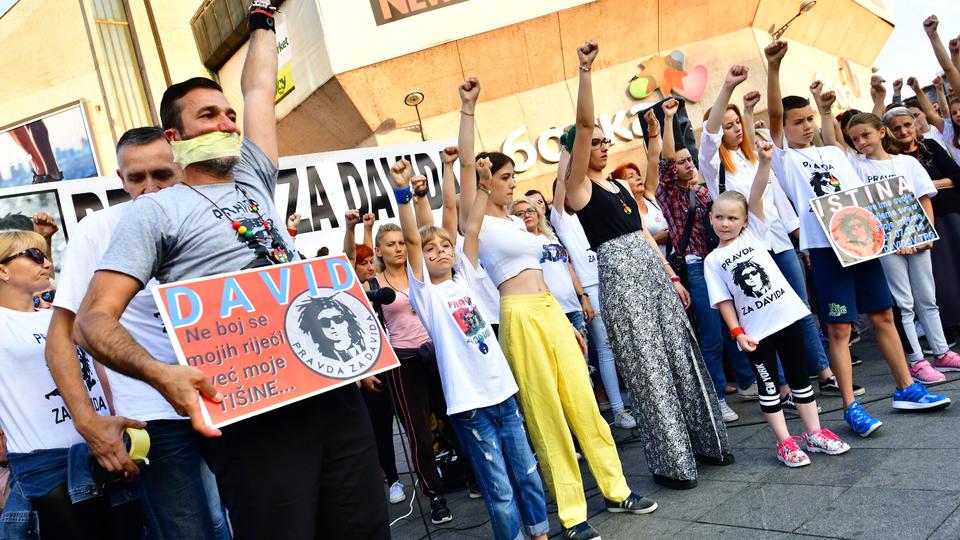The protest movement that has recently thrust Bosnia in the international spotlight is yet another warning sign that stability in the Balkans remains illusory. The dangerous mix of nationalism and corruption boiling in Republika Srpska (one of two entities) threatens to set off a wave of unrest that jeopardizes all of Europe.
The crisis unfolding today started with the death last March of David Dragicevic, a 21-year-old activist who had previously protested police brutality and unexplained deaths. Despite wounds suggesting a violent struggle, authorities initially ruled his death a suicide. David’s father accused the authorities of a cover-up and began staging daily protests.
Under public pressure, police finally initiated a murder investigation last July. Since then, the protest movement has exploded, with thousands taking to the streets to demand a purge of the police leadership. Those joining the movement see David Dragicevic’s death as symbolic of the rampant corruption and accompanying economic malaise that dictate life in Bosnia.
Protests in 2014
The movement is reminiscent of February 2014, when thousands of protesters in more than a dozen Bosnian cities turned out in the streets angered by primarily economic grievances – and the perception that political leaders were unwilling or unable to deal with them.
The “Bosnian Spring” resulted in hundreds of injuries and prompted the resignation of several senior regional officials. Still, Bosnia’s security minister presciently warned of a coming “anti-corruption tsunami.”
Despite the warning, corruption since that tumultuous period has only worsened. Bosnia scored a 38 out of 100 (0 being the most corrupt and 100 the cleanest) in the widely cited Corruption Transparency Index, placing it among the most corrupt in all of Europe. Dragicevic’s death serves as a most poignant reminder to average Bosnians that unchecked corruption can easily spread beyond petty indignities.
Similar Phenomenon
The world witnessed a similar phenomenon eight years ago in the death of Tunisian fruit vendor Mohammed Bouazizi. The 26-year-old Bouazizi, fed up with corruption and police arrogance at the market, tried to stop a female police officer from taking his fruit. She responded with a slap across his face. “Why are you doing this to me?” he reportedly cried. “I’m a simple person, and I just want to work.”
When no city official would see him to address the degrading treatment, Bouazizi set himself on fire in front of the municipal building. Anti-regime activists who mobilized thousands after the incident commented that Bouazizi’s self-immolation was “the product of poverty, unemployment and a sense of degradation and indignity that reflected the frustration and despair felt by young men throughout Tunisia.”
Bouazizi served as the spark that brought down Tunisian dictator Zine El Abidine Ben Ali and set off the Arab Spring. Could Dragicevic be the spark that sets off Bosnia, and perhaps the rest of the Balkans? An administrative reshuffling or an investigation might stave off a real breakdown. But there are several reasons for pessimism in the longer term.
Political Trust and Ethnic Division
For one, Bosnia’s pervasive corruption has helped bleed the fledgling state of its legitimacy. Surveys conducted by the local Analitika Center for Social Research show that throughout the mid-2010s more than three-quarters of Bosnian citizens expressed little to no trust in the country’s political parties. Nearly 70 percent felt distrust toward the state and local governments.
There is also the obvious ethnic component. While anti-corruption protests in other parts of the world have united populations, in Bosnia they have merely highlighted just how divided the Bosnians are.
The 2014 anti-corruption protests were largely centered in the Croat-Muslim part of Bosnia. Milorad Dodik, then the president of the Serb-controlled Republika Srpska, accused Bosniaks of organizing the relatively few protests that did occur in his territory. “This is one unhappy country that needs to be split into three parts so that people could live peacefully,” he concluded.
Today’s protests, by contrast, have been mostly contained to Republika Srpska, where Serbian residents are much more likely to identify themselves by their ethnic group (65 percent) than as citizens of Bosnia and Herzegovina (12 percent).
Protests Pose Real Threat
Ethnic splits in Bosnian society might provide some short-term security for those in power, making broad mobilization difficult. But in the long run, these protests pose real threats to the state and region.
Dodik, who rode a nationalist electoral wave last fall to become Republika Srpska’s representative to the country’s tripartite presidency, has warned fellow Serbs that the protesters are part of a murky, foreign-backed “special warfare” effort against Republika Srpska. Local officials who showed support for the Dragicevic protesters were reportedly demoted and Dodik accused the opposition of using David’s death for their own political goals.
All of these moves threaten to undermine Bosnia’s already weak democratic institutions and fuel Dodik’s campaign to rip Republika Srpska out of Bosnia. Senior Bosniak politicians have previously said that any secession would mean war. Should conflict erupt, Russia, with its strong ties to Republika Srpska, coupled with its disdain for the decision by the West to grant Kosovo independence, is unlikely to sit out the fight. Neither would the European Union, which includes an increasingly nationalist Croatia.
The protest movement today should not be seen as an isolated event but as the symptom of a very dangerous disease. This bout may soon subside, but the underlying problem won’t go away without drastic intervention.



